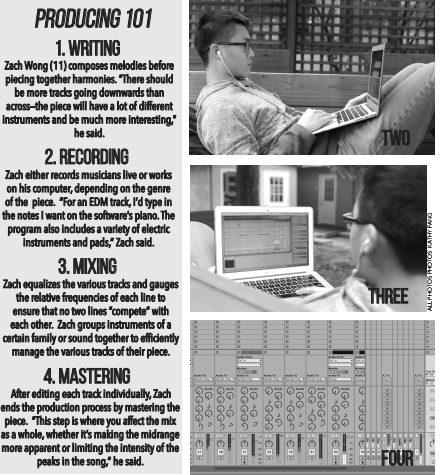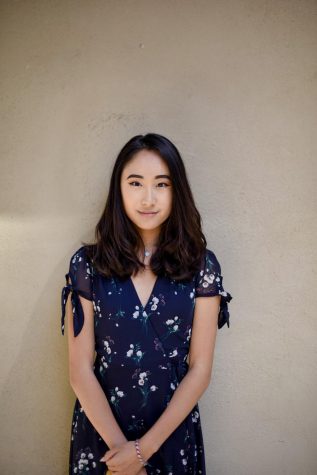Student Spotlight: Student artists produce original songs
February 5, 2018
A sea of sound waves snake across the screen, each a dynamic cycle of pixelated peaks and valleys. Headphones in, foot tapping to the composition’s heartbeat, the artist scans the multitude of dials positioned near the bottom of the software interface and tweaks an electric guitar melody until the line smooths out, now perfectly in equilibrium with the rest of the piece.
Music production, or the writing and recording of music, challenges artists to translate their musical ideas into the right combinations of sounds and notes. Often using online software to compose their tracks, music producers repeatedly play and redo parts of their works until they achieve the desired tone and texture.
“I enter notes on [the composition program] MuseScore. If that doesn’t give me what I had in mind, I take those notes as a .midi file and put them into GarageBand to get different sounds,” SoundCloud artist Annabelle Perng (11) said. “I really like to put drums in my music to give the piece character and liveliness.”
Some students have decided to take their producing careers even further, moving into the business realm of music. Gowtham Irrinki (9) earns money by producing and selling his beats. Gowtham’s brother, Srivinay Irrinki (‘15), helped him get involved in producing. Gowtham recently had his music played on local radio station 91.7 KSVR and at the upper school’s Winter Ball.
“Money-wise, I charge anywhere from $25 to $80 for a YouTube lease. For anyone who finds my YouTube and wants to buy a beat, I charge them to use it and to rap or sing over it,” he said. “I currently have a deal with the artist I’m working with; however much money he makes off of his streams on Spotify, I get 30% of that. So far, I’ve earned about $1,000.”
Aside from electronic music and hip hop producers, the upper school also has students who compose classical music. Emily Liu (10), who won HELM’s September contest with her piece “Divertimento,” shows that not much experience is needed to get involved in a new activity.
“I started out coming up with really small compositions in sixth grade, but I actually only began composing last year,” Emily said. “I was just bored one day and decided to compose music. I started by installing a music composition software called MuseScore.”
An outlet for expression, music production provides the tools for artists to communicate their musical visions through blending the unique timbres of both computer-generated beats and traditional instruments.
“I was always fascinated with transforming sounds into other sounds. I would play the radio and then play the same song on my phone, and I’d try to change it up,” arranger Zach Wong (11) said. “On Google, I’d search up ‘how do you transform a song into a different song?’ I came into this whole world where you can use music to make an impact on other people—not just as a leisure activity, but also as a performance.”
This piece was originally published in the pages of The Winged Post on February 5, 2018.


















![“[Building nerf blasters] became this outlet of creativity for me that hasn't been matched by anything else. The process [of] making a build complete to your desire is such a painstakingly difficult process, but I've had to learn from [the skills needed from] soldering to proper painting. There's so many different options for everything, if you think about it, it exists. The best part is [that] if it doesn't exist, you can build it yourself," Ishaan Parate said.](https://harkeraquila.com/wp-content/uploads/2022/08/DSC_8149-900x604.jpg)




![“When I came into high school, I was ready to be a follower. But DECA was a game changer for me. It helped me overcome my fear of public speaking, and it's played such a major role in who I've become today. To be able to successfully lead a chapter of 150 students, an officer team and be one of the upperclassmen I once really admired is something I'm [really] proud of,” Anvitha Tummala ('21) said.](https://harkeraquila.com/wp-content/uploads/2021/07/Screen-Shot-2021-07-25-at-9.50.05-AM-900x594.png)







![“I think getting up in the morning and having a sense of purpose [is exciting]. I think without a certain amount of drive, life is kind of obsolete and mundane, and I think having that every single day is what makes each day unique and kind of makes life exciting,” Neymika Jain (12) said.](https://harkeraquila.com/wp-content/uploads/2017/06/Screen-Shot-2017-06-03-at-4.54.16-PM.png)








![“My slogan is ‘slow feet, don’t eat, and I’m hungry.’ You need to run fast to get where you are–you aren't going to get those championships if you aren't fast,” Angel Cervantes (12) said. “I want to do well in school on my tests and in track and win championships for my team. I live by that, [and] I can do that anywhere: in the classroom or on the field.”](https://harkeraquila.com/wp-content/uploads/2018/06/DSC5146-900x601.jpg)
![“[Volleyball has] taught me how to fall correctly, and another thing it taught is that you don’t have to be the best at something to be good at it. If you just hit the ball in a smart way, then it still scores points and you’re good at it. You could be a background player and still make a much bigger impact on the team than you would think,” Anya Gert (’20) said.](https://harkeraquila.com/wp-content/uploads/2020/06/AnnaGert_JinTuan_HoHPhotoEdited-600x900.jpeg)

![“I'm not nearly there yet, but [my confidence has] definitely been getting better since I was pretty shy and timid coming into Harker my freshman year. I know that there's a lot of people that are really confident in what they do, and I really admire them. Everyone's so driven and that has really pushed me to kind of try to find my own place in high school and be more confident,” Alyssa Huang (’20) said.](https://harkeraquila.com/wp-content/uploads/2020/06/AlyssaHuang_EmilyChen_HoHPhoto-900x749.jpeg)







